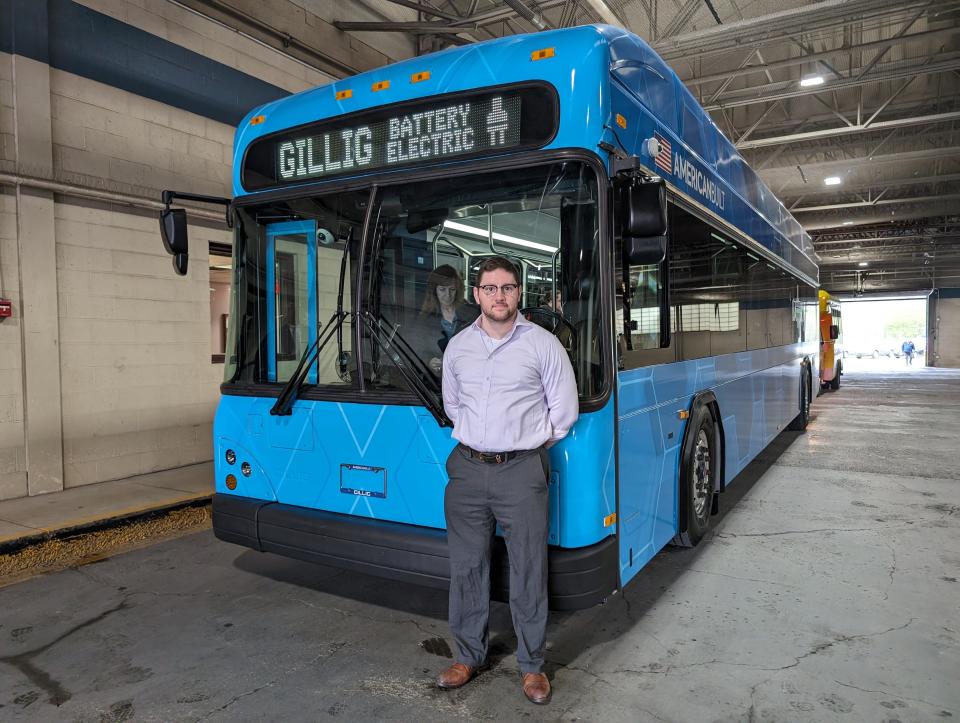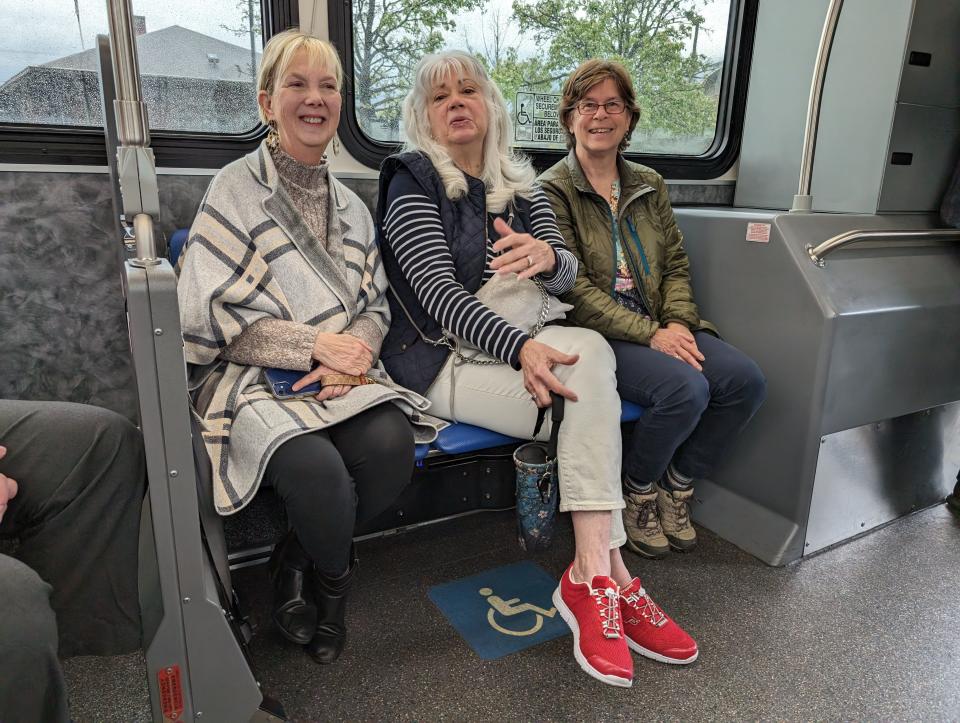Bus riders bemoan aging fleet, suspended routes: What Ithaca's transit agency is doing
Has getting around Tompkins County felt harder recently?
If you said yes, you’re not alone.
Tompkins County’s Transportation Equity Coalition has released the results of a county-wide Transportation Equity Needs Assessment, which found that self-identified limited, low or no-income county residents — accounting for 19% of the study's 3,454 responses — said getting around the county is “hard” or “very hard.”
The assessment also found that people who earn a lower or fixed income are more likely to use Tompkins Consolidated Area Transit (TCAT) buses to make their essential trips. Nearly all respondents noted “no buses when needed” as their most common barrier to travel when asked about difficulties getting around, according to the coalition.
TCAT officials say this is due in part to the COVID-19 pandemic, and it is among the entities suffering lasting effects on the state’s workforce and economy.

“The main priority right now is to get increased service, get our service back to becoming more reliable, bring more vehicles back into service, address a lot of our maintenance challenges, and get our service levels back up to where we were pre-COVID,” said TCAT's newly hired General Manager, Matthew Rosenbloom-Jones, on Wednesday.
Elimination of TCAT routes serving West Hill, Cornell, Cayuga Heights concerns residents
The organization's bus lines 14S and 83 have been on suspension since last fall due to staffing and vehicle issues. On Thursday, the TCAT Board of Directors voted to prolong the suspension of the routes, which serve West Hill businesses along with the Cornell campus and Cayuga Heights area.
Some Ithaca residents spoke out about this issue at a public meeting April 17, with many of their woes echoed in a letter sent to the board by Nikki Dirkin of Ithaca, which TCAT Board Chair Deborah Dawson read aloud during the public comment section of the meeting.
“Losing the 14S has made it difficult for seniors of the West Hill Route 14 to access grocery stores, merchandise and services. It has been a loss of independence, which Gadabout cannot replace,” Dirkin wrote, mentioning the service that caters to seniors. “TCAT’s solution is for West Hill residents to take the 14 downtown and transfer to the 15 shopper shuttle.”
“In order to transfer to the 15, you have to walk across the Commons from Green Street to the Seneca Street garage and wait 20 minutes for the 15,” she wrote. “On the return trip if the 15 doesn't align with the 14 at Green Street, it is a 55-minute unsheltered wait with groceries to go home, as the 14 only runs every hour.”
TCAT officials said they intend to get the routes back in service as quickly as possible but did not provide a timeline.
Mechanical issues have added to problems for TCAT
“We kind of have a two-pronged problem, as we get more buses on the road we don’t have enough operators and as we get more operators, we don’t always have enough buses, instead of being able to increase both of those things at the same time,” Rosenbloom-Jones said.
These problems were compounded with mechanical issues with TCAT buses built by Proterra. TCAT's relationship with the transit authority was plagued with the manufacturer's financial problems, a lack of support, and low availability of parts needed for repairs after the vendor filed for bankruptcy, Rosenbloom-Jones said.
Protests on campus: Cornell clogged by Israel-Palestine protesters. What we know
Renewable energy: NY created an agency to approve more wind, solar farms. An audit says it's too slow.
These issues came to a head last week, when TCAT pulled all eight of its Proterra buses, which it purchased in 2021, from service due to safety concerns.
This is not the case with Gillig, the company that TCAT is eyeing for its next shot at an electric fleet. TCAT will be purchasing five diesel buses for $547,000 each to replace the eight Proterra buses and fill service gaps.
Opposed to Gilligs electric buses - coming in at a hefty $988,311 per bus, slightly higher than the fleets now decommissioned Proterra buses cost them in 2020 ($954,265 each) - they're much cheaper, but an electric fleet is still being eyed by the organization.
“We’ve had very good luck with Gillig. They're a trusted vendor who’s been in the industry for a long time. We have Gilligs in our fleet now that are from 2011, so we’ve worked with them for a long time, and we’re very happy with the support we get and that relationship.”
Pulling back to pre-pandemic levels

Some of TCAT’s officials, longtime drivers and new employees took a test ride on an electric Gillig bus Wednesday.
Agnes Beck, a driver with TCAT for the last nine years, drove it along the now-suspended 14S route throughout western Ithaca, a trip many of TCAT’s drivers consider to be a “tough route.”
Beck said the bus blew Proterra’s electric fleet out of the water, and said the vehicles were “not even comparable” in terms of comfort and safety.
New buses are nice, but still succumb to the same problems with time. Ithaca’s roads would chew up the bus, Beck said, likely leading to the rattling and disrepair that TCAT’s ridership has become used to.
Poor road conditions and tight turns don’t just tear up the buses, but the drivers too, she said, blaming aching necks and bad backs for some of TCAT’s recent employment woes.
TCAT hired new drivers recently, but the training and certification can take months.
“We got about five new hires that started today,” Rosenbloom-Jones said during the test drive. “We’re hoping to get as many classes started as possible but it’s a very challenging market right now. The way forward is just to continue to hire and bring people on board. We offer paid training to get your CDL, which is not a benefit everyone offers, and we can then try to get more operators into service.”
TCAT had 90 drivers as of 2018, but pared down its staff about 33%, down to about 60 full-time drivers, according to the organization's October 2023 staffing report.
TCAT is also getting guidance and funding from the city, Tompkins County and Cornell University, the organization's largest benefactors and its “three main underwriters,” according to Rosenbloom-Jones.
“Everybody wants TCAT to be back at our pre-pandemic levels as soon as possible,” he said. “But we still have some additional leg work to do just as far as time needed to get vehicles on the road and drive this train forward.”
This article originally appeared on Ithaca Journal: TCAT impacted by suspended routes in Ithaca, issues with buses

